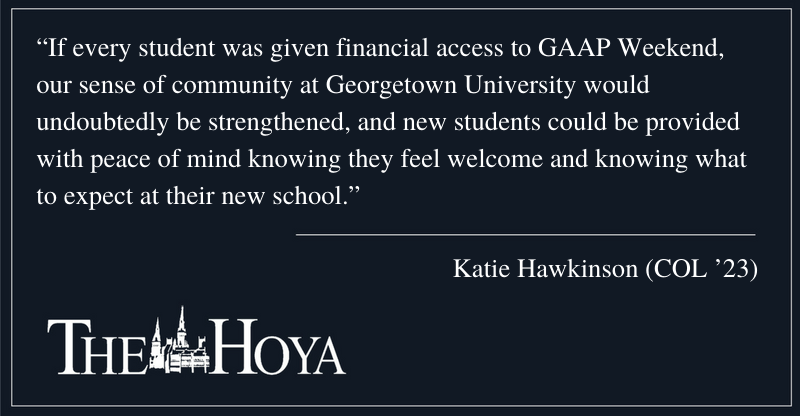The first time I saw the entirety of Georgetown University’s campus was move-in day. While it was so exciting and special to see where I would be eating, sleeping and attending class for the next four years, I clearly remember the feelings of exclusion and apprehension throughout the spring and summer as a result of my inability to visit campus before the fall semester began.
The various events and programming that were put on by Georgetown to introduce new students to life on campus were unavailable to me due to the financial burden posed by traveling to Washington, D.C., especially from my hometown in Washington state. Georgetown cannot exclude students based on their economic situation from informative and community-building experiences.
The most prominent pre-move-in programming is put on by the Georgetown Admissions Ambassador Program. The program offers a variety of events for prospective and admitted students, most notably GAAP weekends. Held throughout the spring, the weekends focus on introducing students to Georgetown’s academic and social culture through campus tours, department open houses and a campus activities fair. According to its website, the goal is to allow students to “gain greater insight into the Georgetown experience.” Because of the in-person, tangible representation of Georgetown’s community that GAAP weekends provide, they are an incredibly important opportunity that allow new students to understand Georgetown.
When I was first admitted, I read that Georgetown’s class of 2013 had a median household income of $229,100. I was shocked. Immediately, I had feelings of apprehension about committing to Georgetown, for I felt that my socioeconomic status might feel alienating. My family’s income could in no way compare to the income of the average family sending their children to Georgetown.
Being unable to attend GAAP Weekend simply added insult to this injury. Paying for airfare and lodging on such short notice was completely out of the question for me. Despite the high cost, GAAP does not have the budget to offer any scholarships or stipends for students facing financial barriers, according to GAAP President Sarah Malzberg (COL ’20). This lack of financial aid results in the exclusion of any student in a lower socioeconomic bracket who cannot attend due to the cost.
Over and over again, I saw my peers posting photos with Jack the Bulldog and the John Carroll statue at GAAP Weekend, making me feel more isolated from the Georgetown community than ever before. This isolation turned into fears about coming to Georgetown that persisted throughout my summer break. I was consumed with a fear of the unknown and a deep worry that I had missed out on making any friends at Georgetown. Sure, GAAP offers many local “Coffee and Chat” sessions and send-off receptions throughout the country, but these are in no way a replacement for experiencing what life will be like at Georgetown.
There are different ways for new students to access campus in an economically feasible manner. Most notably, the Center for Multicultural Equity and Access coordinates an event called Hoya Saxa Weekend for underrepresented students of color, which features a no-cost experience similar to GAAP Weekend. While I believe this program is a fantastic start to improving the financial availability of community-centered events, Georgetown must make a stronger effort to include all students in GAAP Weekend or similar events.
If every student was given financial access to GAAP, our sense of community on the Hilltop would undoubtedly be strengthened, and new students could be provided with peace of mind knowing they feel welcome and knowing what to expect at their new school. It would show that, despite the statistics concerning income, students of any financial background will be welcomed and supported at Georgetown. This reassurance is important to fostering an environment that feels accessible to all and supportive of individual students’ needs.
If this problem is not solved, Georgetown will be sending the message that low-income students will not be provided the same opportunities as their wealthier peers. Georgetown must invest more funds into ensuring all students feel welcomed into our community and that they will not be at a disadvantage here due to their economic standing. The university must not continue to leave students behind.
Katie Hawkinson is a freshman in the College.









